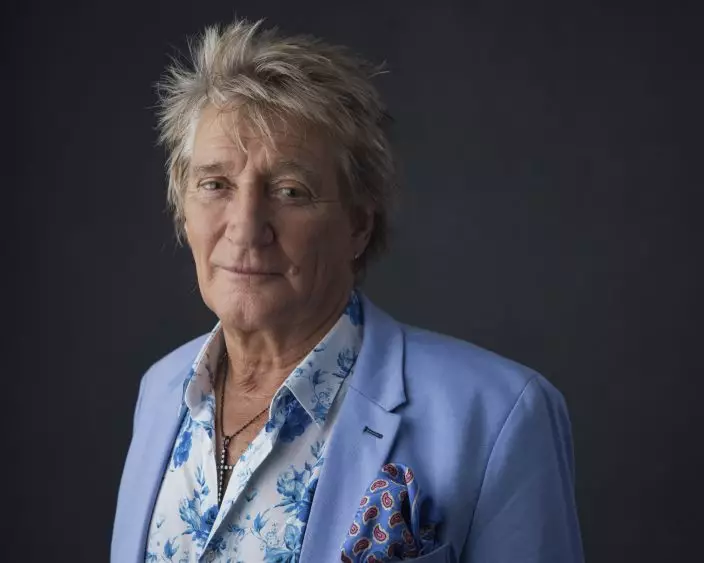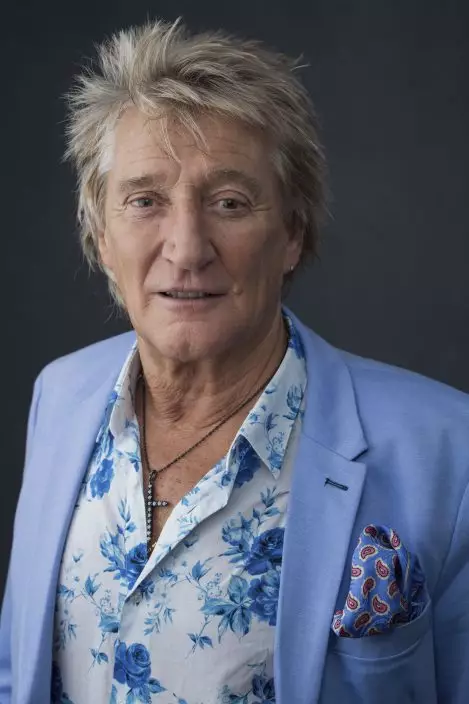More than fifty years into his career, Rod Stewart shows no sign of slowing down.
When he's not on tour, he's busy at home chasing his two young sons, Aiden and Alastair, around the yard. And on Sept. 28, he will release his 30th studio album, "Blood Red Roses."
While known for writing sultry songs — from "Tonight's the Night (Gonna Be Alright)" to "You're In My Heart (The Final Acclaim)" — Stewart's also not afraid to tackle social issues. In 1976, he broke new ground with "The Killing of Georgie (Part I and II)," about his friend who was killed because of his sexual identity.

Rod Stewart poses for a portrait on Wednesday, Aug. 8, 2018 in New York to promote his tour and upcoming album, "Blood Red Roses." (Photo by Drew GurianInvisionAP)
Stewart dismisses the idea of being courageous writing the first mainstream pop song to deal with gay bashing.
"It was a true story and it's much easier to write about the truth," Stewart said about the iconic song.
The 73-year old crooner gets serious again with his new album's first single, "Didn't I," which deals with teenage substance abuse from the parent's perspective.

Rod Stewart poses for a portrait on Wednesday, Aug. 8, 2018 in New York to promote his tour and upcoming album, "Blood Red Roses." (Photo by Drew GurianInvisionAP)
In an interview with The Associated Press this week, the Grammy-winning singer discussed his longevity in the music business, what he thinks of the #MeToo movement and maintaining his signature hairstyle.
AP: That hair is just amazing. How do you keep it up?
Stewart: It's pretty good, isn't it? I don't know. I think I've just been lucky, you know, with the hair. It gets a lot of manipulation, you know, because I always have to keep it (up). When I'm doing a show, I have to go and dry it. ...I cut it every two weeks. No, but other than that I just think I'm lucky.
AP: You move pretty well onstage for a guy in his seventies...
Stewart: Soccer has always been a passion of mine. You know, I played it, read about it, watched it all my life, and I still play a little bit. And I do work out a lot, I must admit. And that keeps me fit for onstage. How long can I go on? That's the million-dollar question. You know, I enjoy it. I get excited about it, and as long as that exists, I think I can carry on for another three weeks (laughs).
AP: Your two sons were onstage with you at your Madison Square Garden show this week. Do you always take them on the road?
Stewart: They don't come on the stage every night. Only when they're on tour (with me in the summer). And they pester me. The older one is getting a bit too old for it now. But the young one loves it. You know, he loves it. But having younger kids, I've got eight kids all together, certainly does keep you on your toes, and they, especially the youngest one, he's just so cute. He amuses me all day long. It makes me smile. And that's longevity in itself, I think being able to smile all day.
AP: You've always been a fan of the ladies, do you consider yourself a.
Stewart: Sex symbol? Now I hate that word. ..I never purposely went out to attract the opposite sex. I mean, it just comes with the music, you know, the music is very sensuous and vibrant. So, if I do something suggestive onstage it's merely by accident.
AP: "The Killing of Georgie" was bold for its time. Do you feel it helped change attitudes in some small way?
Stewart: Yeah, yeah, you're right. It was actually banned by the BBC when it first came out. But the most interesting thing about "Georgie" is I bump into a lot of people, gay men who say, "You know when 'The Killing of Georgie' came out, it really helped me through my breaking out and feeling proud about who I am." And that means a lot to me.
AP: The industry has changed. Is it no longer sex, drugs and rock 'n' roll?
Stewart: Obviously, I'm not, you know, sweet 16 anymore, and there are things I have to preserve, namely my voice. I really have to look after that. So, as I said, I was never really a druggy-type person because I played football and I was always getting up in the morning playing football and so that side hasn't changed a great deal for me.
AP: But things are changing, especially with the #MeToo movement.
Stewart: Well that's true. There were a lot of women throwing themselves at us in the '70s and '80s, and they were good old times, really great times. But, you know, the #MeToo movement is long overdue. But I must admit I've never had trouble, you know, entertaining women. I've always enjoyed the chase, actually. I'd never thrown myself on any woman. You know, I enjoyed romance and then the chase.
AP: Do you ever look back and go, "Wow, what a career?"
Stewart: Every day. Every day. I never take it for granted. I really don't. You know, it's just the best job in the world. I know that's an old cliche, but it really is. (President Donald) Trump thinks he's got a good job. I've really got a great job.
Online:
http://www.rodstewart.com/
UNITED NATIONS (AP) — Russia on Wednesday vetoed a U.N. resolution sponsored by the United States and Japan calling on all nations to prevent a dangerous nuclear arms race in outer space, calling it “a dirty spectacle” that cherry picks weapons of mass destruction from all other weapons that should also be banned.
The vote in the 15-member Security Council was 13 in favor, Russia opposed and China abstaining.
The resolution would have called on all countries not to develop or deploy nuclear arms or other weapons of mass destruction in space, as banned under a 1967 international treaty that included the U.S. and Russia, and to agree to the need to verify compliance.
U.S. Ambassador Linda Thomas-Greenfield said after the vote that Russian President Vladimir Putin has said Moscow has no intention of deploying nuclear weapons in space.
“Today’s veto begs the question: Why? Why, if you are following the rules, would you not support a resolution that reaffirms them? What could you possibly be hiding,” she asked. “It’s baffling. And it’s a shame.”
Russia’s U.N. Ambassador Vassily Nebenzia dismissed the resolution as “absolutely absurd and politicized,” and said it didn’t go far enough in banning all types of weapons in space.
Russia and China proposed an amendment to the U.S.-Japan draft that would call on all countries, especially those with major space capabilities, “to prevent for all time the placement of weapons in outer space, and the threat of use of force in outer spaces.”
The vote was 7 countries in favor, 7 against, and one abstention and the amendment was defeated because it failed to get the minimum 9 “yes” votes required for adoption.
The U.S. opposed the amendment, and after the vote Nebenzia addressed the U.S. ambassador saying: “We want a ban on the placement of weapons of any kind in outer space, not just WMDs (weapons of mass destruction). But you don’t want that. And let me ask you that very same question. Why?”
He said much of the U.S. and Japan’s actions become clear “if we recall that the U.S. and their allies announced some time ago plans to place weapons … in outer space.”
Nebenzia accused the U.S. of blocking a Russian-Chinese proposal since 2008 for a treaty against putting weapons in outer space.
Thomas-Greenfield accused Russia of undermining global treaties to prevent the spread of nuclear weapons, irresponsibly invoking “dangerous nuclear rhetoric,” walking away from several of its arms control obligations, and refusing to engage “in substantive discussions around arms control or risk reduction.”
She called Wednesday’s vote “a real missed opportunity to rebuild much-needed trust in existing arms control obligations.”
Thomas-Greenfield’s announcement of the resolution on March 18 followed White House confirmation in February that Russia has obtained a “troubling” anti-satellite weapon capability, although such a weapon is not operational yet.
Putin declared later that Moscow has no intention of deploying nuclear weapons in space, claiming that the country has only developed space capabilities similar to those of the U.S.
Thomas-Greenfield said before the vote that the world is just beginning to understand “the catastrophic ramifications of a nuclear explosion in space.”
It could destroy “thousands of satellites operated by countries and companies around the world — and wipe out the vital communications, scientific, meteorological, agricultural, commercial, and national security services we all depend on,” she said.
The defeated draft resolution said “the prevention of an arms race in outer space would avert a grave danger for international peace and security.” It would have urged all countries carrying out activities in exploring and using outer space to comply with international law and the U.N. Charter.
The draft would have affirmed that countries that ratified the 1967 Outer Space Treaty must comply with their obligations not to put in orbit around the Earth “any objects” with weapons of mass destruction, or install them “on celestial bodies, or station such weapons in outer space.”
The treaty, ratified by some 114 countries, including the U.S. and Russia, prohibits the deployment of “nuclear weapons or any other kinds of weapons of mass destruction” in orbit or the stationing of “weapons in outer space in any other manner.”
The draft resolution emphasized “the necessity of further measures, including political commitments and legally binding instruments, with appropriate and effective provisions for verification, to prevent an arms race in outer space in all its aspects.”
It reiterated that the U.N. Conference on Disarmament, based in Geneva, has the primary responsibility to negotiate agreements on preventing an arms race in outer space.
The 65-nation body has achieved few results and has largely devolved into a venue for countries to voice criticism of others’ weapons programs or defend their own. The draft resolution would have urged the conference “to adopt and implement a balanced and comprehensive program of work.”
At the March council meeting where the U.S.-Japan initiative was launched, U.N. Secretary-General António Guterres warned that “geopolitical tensions and mistrust have escalated the risk of nuclear warfare to its highest point in decades.”
He said the movie “Oppenheimer” about Robert Oppenheimer, who directed the U.S. project during World War II that developed the atomic bomb, “brought the harsh reality of nuclear doomsday to vivid life for millions around the world.”
“Humanity cannot survive a sequel to Oppenheimer,” the U.N. chief said.

United States Ambassador and Representative to the United Nations Linda Thomas-Greenfield addresses members of the U.N. Security Council before voting during a meeting on Non-proliferation of nuclear weapons, Wednesday, April 24, 2024 at United Nations headquarters. (AP Photo/Eduardo Munoz Alvarez)

FILE - U.S. Ambassador to United Nations Linda Thomas-Greenfield speaks on Thursday, April 18, 2024, in Tokyo. The U.N. Security Council is set to vote Wednesday, April 24, 2024, on a resolution announced by Thomas-Greenfield, calling on all nations to prevent a dangerous nuclear arms race in outer space. It is likely to be vetoed by Russia. (AP Photo/Eugene Hoshiko, Pool, File)













